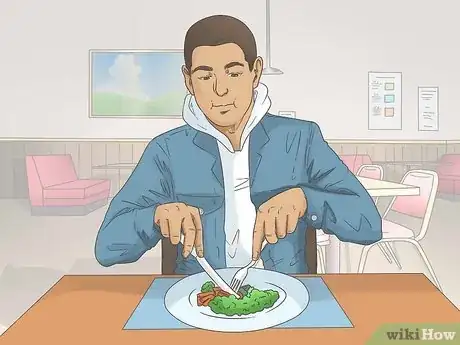This article was co-authored by Jin S. Kim, MA. Jin Kim is a Licensed Marriage and Family Therapist based out of Los Angeles, California. Jin specializes in working with LGBTQ individuals, people of color, and those that may have challenges related to reconciling multiple and intersectional identities. Jin received his Masters in Clinical Psychology from Antioch University Los Angeles, with a specialization in LGBT-Affirming Psychology, in 2015.
There are 11 references cited in this article, which can be found at the bottom of the page.
wikiHow marks an article as reader-approved once it receives enough positive feedback. In this case, 100% of readers who voted found the article helpful, earning it our reader-approved status.
This article has been viewed 165,780 times.
If you’ve just gone through a divorce, you'll quickly realize that your life has changed in many ways, good and bad. Although it’s painful to end a marriage, you just might find a silver lining to the whole experience awaiting you. Learn to be happy after your divorce by rediscovering yourself as a single person, getting support, and making positive decisions for your future.
Steps
Reconnecting with Yourself
-
1Learn your likes and dislikes as a single person. If you’ve been a part of a couple for many years, you may have lost touch with your core identity. Use this time to get back to yourself. Remember the person you were before your marriage and consider the person you would like to become.[1]
- Sit down and make a list of your likes and dislikes. Focus solely on your own preferences—try to avoid thinking about your spouse’s opinion.
- For example, you may be working in a job that you don’t really like because it was best for your family at the time. Or you might still make your spouse’s favorite meal even though it’s not your favorite.
-
2Discover your passions. If you have hobbies, use your newfound freedom to dedicate more time to them. If you don’t have any hobbies, think about starting a few. What are some activities you always put off doing because you didn’t have time or because your spouse wasn’t a fan? Now, you can engage in all of these activities.[2]
- For instance, you might start cycling again on weekends. Or, if you’re a bookworm, you can join a local book club.
- Take this opportunity to pick up some new hobbies. Try something you've always wanted to learn, or start a club for an old passion.
Advertisement -
3Embrace new habits and roles. Divorce pushes you to develop aspects of yourself that you never had to before. For instance, if your spouse did all the shopping and cooking, you may need to learn how to take on this role. If they were the primary breadwinner, you might have to get a job or find one with better pay.[3]
- Instead of viewing these new roles as just added stress, see them as an opportunity to push past your comfort zone. In fact, you can learn to enjoy new roles by making a list of all the tasks you do now that you didn't feel capable of before.
- If you were a stay-at-home parent while your spouse worked, you will likely need to get back out onto the job market. Take this time to learn new skills that might help you get a new job.
- Don't be afraid to try new things. Work towards self-improvement, and you'll be happier in the long run.
-
4Travel alone. Visiting new places is a great way to rediscover yourself and get outside your comfort zone. Plus, traveling helps you become more aware of what you like and don’t like, because no one else will be influencing your decisions. See the museums you want to see and select the restaurants that seem interesting to you.[4]
- Traveling is also a great way to create new memories without your spouse.
- Visit a nearby city that you’ve never explored or plan a big trip across country or across continents.
Finding Support
-
1Lean on good friends and family. Your support system is vital in the aftermath of your divorce. Just be sure you’re spending time with positive influences who make you feel good about yourself and your future.[5]
- Start a new tradition with your social group, such as Sunday brunch or Friday game nights. This will give you something to look forward to.
- Remove people from your life that influence you to make negative choices, such as dwelling in the past or using alcohol or drugs to cope.
-
2Join a support group. Reach out to people in your local community who are going through a divorce, too. Talking to people who “get” you can help you feel less alone. Plus, some of the support group members may have helpful solutions to many of the problems you face.[6]
- Conduct a quick online search to locate divorce support groups in your area. You can also contact community centers and churches who may sponsor these groups.
-
3See a therapist. It’s nice to have an unbiased person to talk to about what you’re going through. A therapist can serve as a listening ear and a source of comfort as you navigate life after divorce. Ask your primary care provider for a referral or get recommendations for good therapists from your social group.[7]
Rebuilding Your Life
-
1Set new goals. Goals can propel you forward and offer a powerful source of motivation. Take some time to think about where you want your life to be in a six months or a year. Then, write out clear and realistic goals that will help you accomplish that vision. Break each goal down into small steps so you can take action towards them daily.[8]
- For instance, maybe you want to raise your credit score so you can buy a new car. You might need to pay down some of your existing debt, which may require making more money or reducing some of your household expenses.
- Setting powerful goals also keeps you busy, so you don’t spend so much time dwelling on the past.
-
2Plan your financial future. Divorce can be expensive. You may need to pay alimony, child support, or legal fees. Take some time to budget your new life in a single income household. Make sure you can afford the necessities while also saving money for retirement and an emergency fund.
- If your spouse did all of the financial planning, you may need to relearn how to do it. Take a financial literacy course at a community college or talk to a financial planner.
- If there are children involved, you will have to plan for their care as well.
- Look as far forward into the future as you can. You may even develop a ten-year plan.
-
3Meet new people. You don’t have to ditch your old pals after your divorce, but you may find that some of your friendships fall apart or change. That’s completely normal. To counteract changes in your social circle, make an attempt to meet new people that share your interests or goals. Join new clubs or organizations to connect with people like you.[9]
- Meeting new people also refers to potential dates. Don’t be afraid to connect with someone new when you’re ready. Focus on just having a good time at first. Then, see where it goes.[10]
-
4Practice self-care. You’re now performing all the roles your spouse once handled, which means you may feel like you have even less time in a day. Regardless if it’s just ten minutes a day, try to steal some time away to do something for yourself. Try reading a book, listening to calming music, stretching, or going for a walk outside.[11]
-
5Support your health and wellness. Going through a divorce is stressful on the body and mind. Support your well-being by making positive choices. Try to eat balanced and nutritious meals regularly. Get seven to nine hours of sleep each night. Exercise for about 30 minutes on most days of the week.[12]
- Resist the urge to cope with your feelings by bingeing on junk foods, using alcohol or drugs, or spending excess money shopping or gambling.
Finding Happiness with Your Kids
-
1Establish a new normal. Creating structure after your divorce can help you and your kids adjust to your new reality. Plus, a new routine makes things less confusing and can even give everyone a peace of mind.[13]
- As soon as you can, work out the basic elements of your routine and share them with your children. Add in new activities and tasks that fit your new life, such as signing them up for after-school programs or spending weekends with the other parent.
- Consider developing new traditions for you and your kids, too. For instance, if they visit the other parent on weekends, you might initiate a family game night or movie night on a weekday. Or, if you won't have your children on Christmas Day, you might open gifts and have a nice dinner on Christmas Eve.
-
2Cherish parent-child time. Bonding with your children is essential to helping all of you move forward after the divorce. Schedule in time with each child individually and with them all as a group. Watch TV together, do parallel tasks like chores or reading, ask about school and their friendships, and encourage them to share their feelings about the divorce.[14]
- Fostering a healthy relationship with your children will also lessen the negative impact of the divorce. Just make sure to never bad-mouth the other parent in front of them.
-
3Ask for help as needed. You may be hesitant to ask others for help, but sometimes a helping hand is exactly what you need. If you’re having trouble adjusting to being a single parent (or a co-parent) or managing certain household responsibilities, get assistance.[15]
- You might ask friends or family members for a hand, like “Veronica, do you mind watching the kids next Thursday so I can get a night off?”
- Or you can hire help in the form of a babysitter, a cleaner, or a financial advisor.
Expert Q&A
Did you know you can get expert answers for this article?
Unlock expert answers by supporting wikiHow
-
QuestionWhat are the signs my partner is thinking about divorce?
 Jin S. Kim, MAJin Kim is a Licensed Marriage and Family Therapist based out of Los Angeles, California. Jin specializes in working with LGBTQ individuals, people of color, and those that may have challenges related to reconciling multiple and intersectional identities. Jin received his Masters in Clinical Psychology from Antioch University Los Angeles, with a specialization in LGBT-Affirming Psychology, in 2015.
Jin S. Kim, MAJin Kim is a Licensed Marriage and Family Therapist based out of Los Angeles, California. Jin specializes in working with LGBTQ individuals, people of color, and those that may have challenges related to reconciling multiple and intersectional identities. Jin received his Masters in Clinical Psychology from Antioch University Los Angeles, with a specialization in LGBT-Affirming Psychology, in 2015.
Licensed Marriage & Family Therapist John Gottman, a renowned psychologist and researcher, studied this and uncovered what he called the "four horsemen" of divorce. In other words, the four signs that your relationship may be leading to divorce. They are criticism, defensiveness, contempt, and stonewalling, which is where someone shuts down during a heated or emotionally-charged conversation.
John Gottman, a renowned psychologist and researcher, studied this and uncovered what he called the "four horsemen" of divorce. In other words, the four signs that your relationship may be leading to divorce. They are criticism, defensiveness, contempt, and stonewalling, which is where someone shuts down during a heated or emotionally-charged conversation. -
QuestionCan you ever be happy after divorce?
 Jin S. Kim, MAJin Kim is a Licensed Marriage and Family Therapist based out of Los Angeles, California. Jin specializes in working with LGBTQ individuals, people of color, and those that may have challenges related to reconciling multiple and intersectional identities. Jin received his Masters in Clinical Psychology from Antioch University Los Angeles, with a specialization in LGBT-Affirming Psychology, in 2015.
Jin S. Kim, MAJin Kim is a Licensed Marriage and Family Therapist based out of Los Angeles, California. Jin specializes in working with LGBTQ individuals, people of color, and those that may have challenges related to reconciling multiple and intersectional identities. Jin received his Masters in Clinical Psychology from Antioch University Los Angeles, with a specialization in LGBT-Affirming Psychology, in 2015.
Licensed Marriage & Family Therapist
-
QuestionWhat should I do immediately after divorce?
 Jin S. Kim, MAJin Kim is a Licensed Marriage and Family Therapist based out of Los Angeles, California. Jin specializes in working with LGBTQ individuals, people of color, and those that may have challenges related to reconciling multiple and intersectional identities. Jin received his Masters in Clinical Psychology from Antioch University Los Angeles, with a specialization in LGBT-Affirming Psychology, in 2015.
Jin S. Kim, MAJin Kim is a Licensed Marriage and Family Therapist based out of Los Angeles, California. Jin specializes in working with LGBTQ individuals, people of color, and those that may have challenges related to reconciling multiple and intersectional identities. Jin received his Masters in Clinical Psychology from Antioch University Los Angeles, with a specialization in LGBT-Affirming Psychology, in 2015.
Licensed Marriage & Family Therapist
References
- ↑ https://www.psychologytoday.com/blog/the-intelligent-divorce/201309/seven-ways-thrive-after-divorce
- ↑ http://www.chicagotribune.com/lifestyles/sc-fam-0113-life-after-divorce-20150106-story.html
- ↑ http://www.webmd.com/sex-relationships/features/life-after-divorce#1
- ↑ http://www.chicagotribune.com/lifestyles/sc-fam-0113-life-after-divorce-20150106-story.html
- ↑ Jin S. Kim, MA. Licensed Marriage & Family Therapist. Expert Interview. 14 May 2019.
- ↑ Jin S. Kim, MA. Licensed Marriage & Family Therapist. Expert Interview. 14 May 2019.
- ↑ Jin S. Kim, MA. Licensed Marriage & Family Therapist. Expert Interview. 14 May 2019.
- ↑ https://goodmenproject.com/divorce/5-tips-for-a-happier-life-after-divorce-that-dont-take-much-effort-wcz/
- ↑ https://www.theguardian.com/lifeandstyle/2014/apr/12/how-i-picked-myself-up-after-divorce
- ↑ https://www.today.com/health/divorce-7-things-not-do-after-breakup-t107167
- ↑ Jin S. Kim, MA. Licensed Marriage & Family Therapist. Expert Interview. 14 May 2019.
- ↑ http://health.usnews.com/health-news/health-wellness/articles/2015/03/26/how-to-stay-healthy-during-a-divorce
- ↑ https://www.today.com/parents/create-successful-parenting-plan-children-after-divorce-wbna7475814
- ↑ https://childpsychologist.com.au/parenting-after-divorce/
- ↑ https://www.helpguide.org/articles/parenting-family/co-parenting-tips-for-divorced-parents.htm












































































